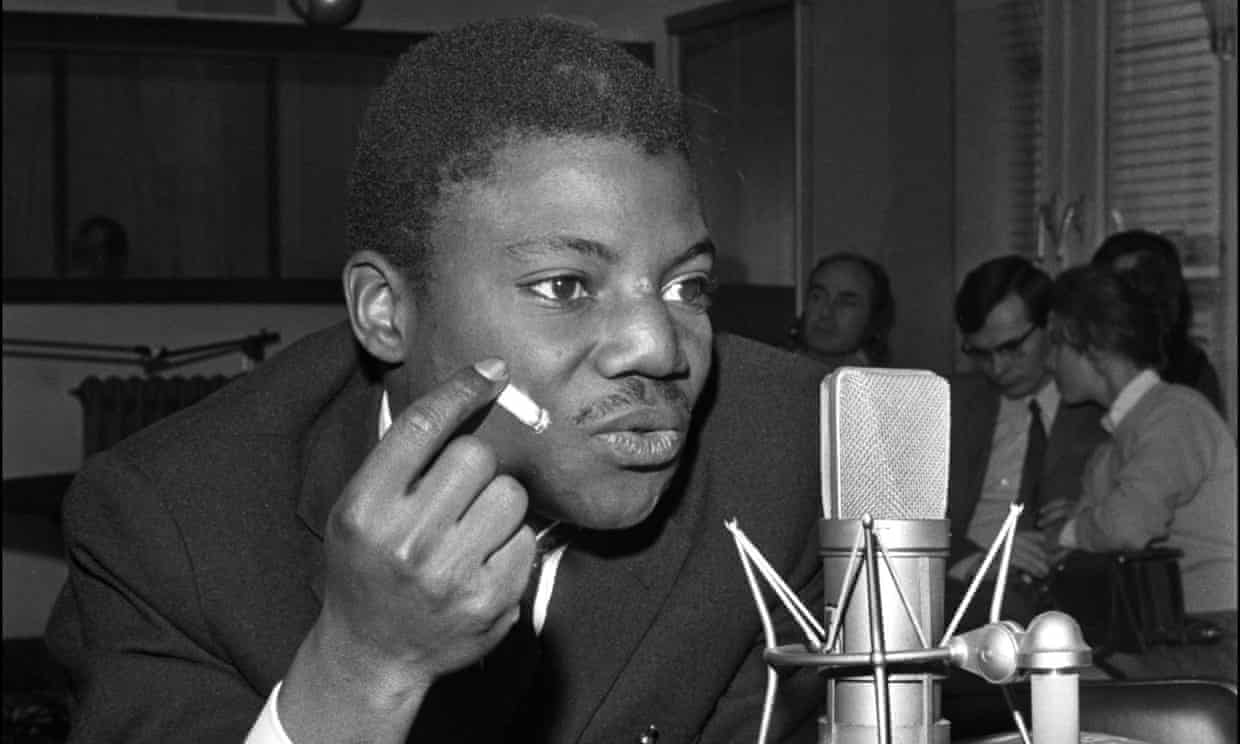Fifty years after being accused of plagiarism, book is reissued in a bid to rehabilitate gifted Malian author Yambo Ouologuem
Vanessa Thorpe Arts and media correspondent
In 1968 the books pages of the French newspaper Le Monde excitedly praised an uncompromising new novel, Bound to Violence, going on to salute its author as one of “the rare intellectuals of international stature presented to the world by Black Africa”.
The newspaper’s words, written in tribute to the young Malian writer Yambo Ouologuem, sound condescending today. Back then, however, the intended compliment was genuine and many European critics soon agreed: the publication of Ouologuem’s strange novel really did mark the arrival of a major new talent.
But the literary world can be brutal, and particularly so for a young African novelist living in Paris who was attempting a fresh twist on conventional storytelling.
Fellow African writers began to express shock at Ouologuem’s harsh parody of his own culture. Three years later damaging accusations of plagiarism had also emerged, including a public skirmish with Graham Greene, which ended Ouologuem’s short career. He retreated into the life of a recluse, returned to Mali and died in 2017, having never published again.
Now, 50 years after this scandal, Penguin Classics is to bring out a new English edition of Bound to Violence in a bid to rehabilitate the gifted author and introduce him to new readers.
“I was so exhilarated when I read this book,” said Penguin editor Ka Bradley. “It’s the history of an imaginary African empire called Nakem and whole centuries are dealt with in just a paragraph or two. It’s dizzying.”

When Ouologuem’s satire first came out in French, as Le Devoir du Violence, it won the prestigious Prix Renaudot award and earned him worldwide interest, with translation rights swiftly snapped up in Britain, West Germany, Italy and the US.
The problems began when an anonymous article in the Times Literary Supplement alerted Greene to a few similarities with his own 1934 novel, It’s a Battlefield. One offending passage in Bound to Violence described a short love scene inside the home of an English Communist that also features in Greene’s story. The dialogue and the setting, with a pink bedroom door and silk bedspreads “like rose petals”, are alike, especially in the 1971 English translation by Ralph Manheim. A further resemblance to sections of André Schwarz-Bart’s book The Last of the Just, including the opening sentences of both novels, were also identified.
When Greene complained to the book’s French publisher, Editions de Seuil, it asked Ouologuem for rewrites to certain pages. Schwarz-Bart, in contrast, was not so bothered, and in fact regarded the use of quotations from his book as “quite thrilling”, according to Bradley. Ouologuem did not comply with his publisher’s request for changes.
“It seems to me this book created such strong feelings because of its very satirical and even sarcastic style. It spares no one and people don’t like that,” said Bradley. “It’s pugnacious, although funny with it, and that kind of humour can really alarm people, creating a backlash. The book was quite a modernist text, with quotations from the Bible and the Qur’an, as well as sections that drew on African oral traditions. Graham Greene was the only one who really objected.”
Bradley suspects that Ouologuem’s youth and ethnicity were held against him: “He was 28 when he won the prize, and there was a sense that some Europeans were wondering just how a young black man could have written this. Some more kindly felt that Ouologuem couldn’t have been expected to know you weren’t supposed to plagiarise like that, whereas I believe it was deliberate. He was writing a kind of pushback against the western literary canon.”
Ouologuem’s style could be likened to Kurt Vonnegut’s work, Bradley suggests: “You know you’re in a wildly ambitious fictional world. There is almost a feeling of collage in the later sections of the book, where the narrative is much more focused on a set of individuals and on the lead character, the Paris-educated Raymond Spartacus Kassoumi.”
Penguin’s decision to republish the work follows an American edition brought out recently by Other Press. It also comes in the wake of its successful publication of an acclaimed novel that draws on the story of Ouologuem’s ruined reputation. Mohamed Mbougar Sarr’s French book, The Most Secret Memory of Men, which won the Prix Goncourt in 2021, mirrors Ouologuem’s story, telling of an African writer in Paris who is damaged by literary misunderstandings and allegations of plagiarism.
The Penguin Classics reissue of Bound to Violence, published in Britain in March, comes, like the American edition, with a new introduction by the Malian scholar Chérif Keïta, which looks at the novel in a wider context. Manheim’s original translation has been preserved with limited tweaks to outdated language. “There are bits of this book that are really unnerving, but then you don’t read a book not to be occasionally unsettled,” said Bradley. “I don’t expect all my political views to be reflected either, but it is a major artistic achievement.”
